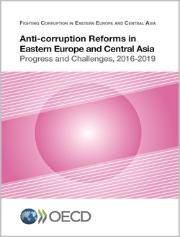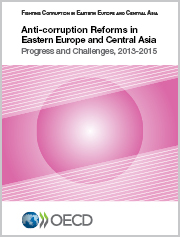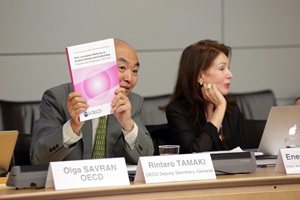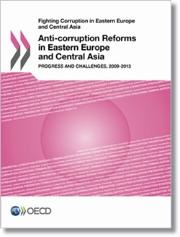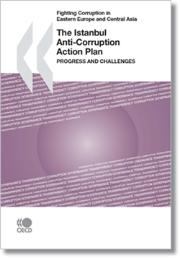Anti-Corruption Network for Eastern Europe and Central Asia
Anti-corruption Reforms in Eastern Europe and Central Asia
Countries in Eastern Europe and central Asia have introduced a number of new important anti-corruption reforms in recent years. However, corruption continues to remain high in the region. This series of reports identify progress achieved as well as remaining challenges which require further action by countries. These reports analyse three broad areas of anti-corruption work: anti-corruption policies and institutions; criminalisation of corruption and ensuring enforcement; and, measures to prevent corruption in public administration and in the business sector. The analysis is illustrated by examples of good practice from various countries and comparative cross-country data.
Date of publication |
2016-2019 progress and challenges reportThis report focuses on nine countries in the region that now participate in the OECD initiative known as the Istanbul Anti-Corruption Action Plan, namely: Armenia, Azerbaijan, Georgia, Kazakhstan, Kyrgyzstan, Mongolia, Tajikistan, Ukraine and Uzbekistan. Examples from other countries in the region are also presented to give a broader perspective for the analysis. The report is based on the results of the fourth round of monitoring of the Action Plan. It updates the information from the 2013-2015 report which summarised the results of the third round of monitoring. Countries reviewed - Armenia, Azerbaijan, Georgia, Kazakhstan, Kyrgyzstan, Mongolia, Tajikistan, Ukraine and Uzbekistan |
||
Progress and Challenges Date of publication |
2013-2015 progress and challenges report14/09/2016 - This report focuses on nine countries in the region that now participate in the OECD initiative known as the Istanbul Anti-Corruption Action Plan, namely: Armenia, Azerbaijan, Georgia, Kazakhstan, Kyrgyzstan, Mongolia, Tajikistan, Ukraine and Uzbekistan. Examples from other countries in the region are also presented to give a broader perspective for the analysis. The report is based on the results of the third round of monitoring of the Action Plan. It updates the information from the 2009-2013 report which summarised the results of the second round of monitoring. Countries reviewed - Armenia, Azerbaijan, Georgia, Kazakhstan, Kyrgyzstan, Mongolia, Tajikistan, Ukraine, Uzbekistan
DSG Tamaki at the launch event on 14 September 2016 in Paris. |
||
Progresses and Challenges
Date of publication Access for government
2008 REPORT English (pdf)
|
2009-2013 progress and challenges report16/08/2013 - The report focuses on eight countries in the region which participated at the time in the OECD initiative known as the Istanbul Anti-Corruption Action Plan, namely Armenia, Azerbaijan, Georgia, Kazakhstan, Kyrgyzstan, Tajikistan, Ukraine and Uzbekistan. Examples from other countries in the region are also presented to give a broader perspective for the analysis. The report is based on the results of the second round of monitoring of the Action Plan. It brings new information to the 2008 report which summarised the results of the first round of monitoring. Countries reviewed - Armenia, Azerbaijan, Georgia, Kazakhstan, Kyrgyzstan, Mongolia, Tajikistan, Ukraine, Uzbekistan
|
Related Documents
